Globalization: Analyzing Benefits, Threats, and Business Strategies
VerifiedAdded on 2021/06/15
|15
|3828
|69
Report
AI Summary
This report offers a comprehensive analysis of globalization's impact on both local and international businesses. It begins by defining globalization and explores its effects on various aspects of business operations, including marketing, production, and distribution. The report examines the positive impacts, such as free capital markets, global markets, foreign trade, and remote staffing, alongside the negative consequences, including increased competition, dumping, exploitation of natural resources, and inequality. A significant portion of the report focuses on strategic recommendations for international managers to navigate the globalized market effectively, emphasizing marketing, partnerships, and operational adjustments. The report concludes with a case study of General Motors, illustrating the practical implications of globalization in a real-world business context, covering how outsourcing and offshoring have contributed to globalization. This detailed overview provides valuable insights into the challenges and opportunities presented by globalization and offers practical strategies for businesses to thrive in the interconnected global economy.

GLOBALIZATION
1
Globalization
Name
Institution
1
Globalization
Name
Institution
Paraphrase This Document
Need a fresh take? Get an instant paraphrase of this document with our AI Paraphraser
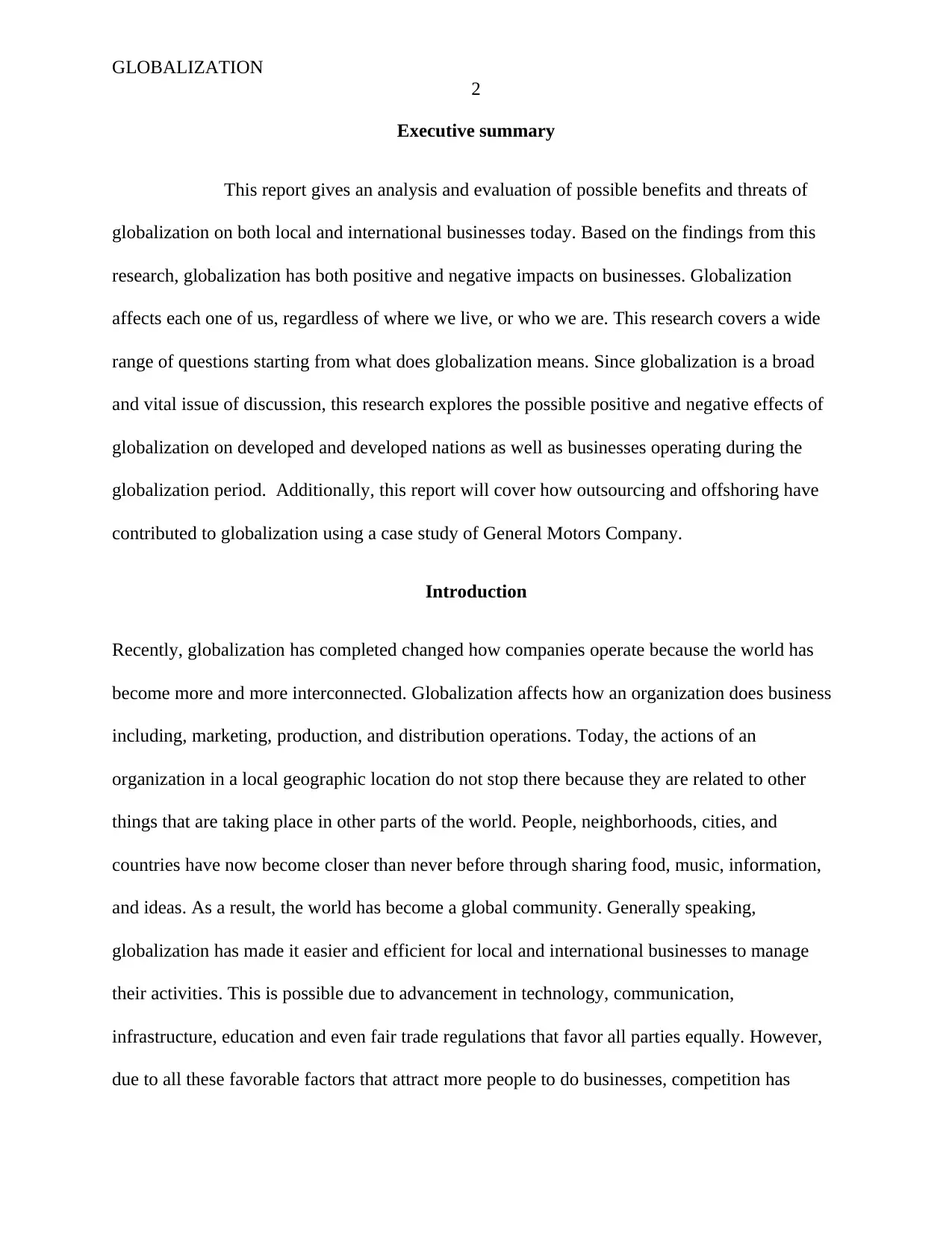
GLOBALIZATION
2
Executive summary
This report gives an analysis and evaluation of possible benefits and threats of
globalization on both local and international businesses today. Based on the findings from this
research, globalization has both positive and negative impacts on businesses. Globalization
affects each one of us, regardless of where we live, or who we are. This research covers a wide
range of questions starting from what does globalization means. Since globalization is a broad
and vital issue of discussion, this research explores the possible positive and negative effects of
globalization on developed and developed nations as well as businesses operating during the
globalization period. Additionally, this report will cover how outsourcing and offshoring have
contributed to globalization using a case study of General Motors Company.
Introduction
Recently, globalization has completed changed how companies operate because the world has
become more and more interconnected. Globalization affects how an organization does business
including, marketing, production, and distribution operations. Today, the actions of an
organization in a local geographic location do not stop there because they are related to other
things that are taking place in other parts of the world. People, neighborhoods, cities, and
countries have now become closer than never before through sharing food, music, information,
and ideas. As a result, the world has become a global community. Generally speaking,
globalization has made it easier and efficient for local and international businesses to manage
their activities. This is possible due to advancement in technology, communication,
infrastructure, education and even fair trade regulations that favor all parties equally. However,
due to all these favorable factors that attract more people to do businesses, competition has
2
Executive summary
This report gives an analysis and evaluation of possible benefits and threats of
globalization on both local and international businesses today. Based on the findings from this
research, globalization has both positive and negative impacts on businesses. Globalization
affects each one of us, regardless of where we live, or who we are. This research covers a wide
range of questions starting from what does globalization means. Since globalization is a broad
and vital issue of discussion, this research explores the possible positive and negative effects of
globalization on developed and developed nations as well as businesses operating during the
globalization period. Additionally, this report will cover how outsourcing and offshoring have
contributed to globalization using a case study of General Motors Company.
Introduction
Recently, globalization has completed changed how companies operate because the world has
become more and more interconnected. Globalization affects how an organization does business
including, marketing, production, and distribution operations. Today, the actions of an
organization in a local geographic location do not stop there because they are related to other
things that are taking place in other parts of the world. People, neighborhoods, cities, and
countries have now become closer than never before through sharing food, music, information,
and ideas. As a result, the world has become a global community. Generally speaking,
globalization has made it easier and efficient for local and international businesses to manage
their activities. This is possible due to advancement in technology, communication,
infrastructure, education and even fair trade regulations that favor all parties equally. However,
due to all these favorable factors that attract more people to do businesses, competition has
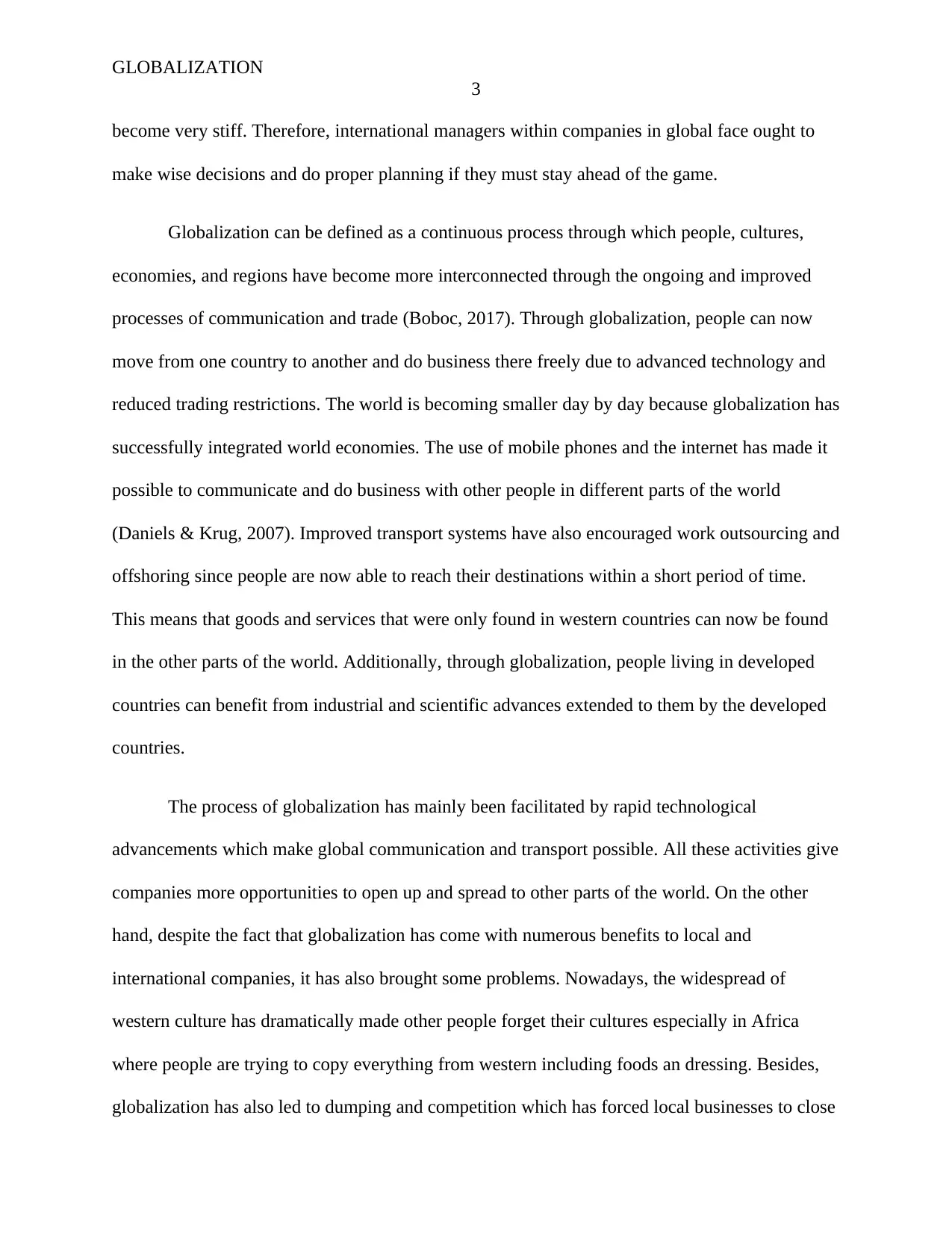
GLOBALIZATION
3
become very stiff. Therefore, international managers within companies in global face ought to
make wise decisions and do proper planning if they must stay ahead of the game.
Globalization can be defined as a continuous process through which people, cultures,
economies, and regions have become more interconnected through the ongoing and improved
processes of communication and trade (Boboc, 2017). Through globalization, people can now
move from one country to another and do business there freely due to advanced technology and
reduced trading restrictions. The world is becoming smaller day by day because globalization has
successfully integrated world economies. The use of mobile phones and the internet has made it
possible to communicate and do business with other people in different parts of the world
(Daniels & Krug, 2007). Improved transport systems have also encouraged work outsourcing and
offshoring since people are now able to reach their destinations within a short period of time.
This means that goods and services that were only found in western countries can now be found
in the other parts of the world. Additionally, through globalization, people living in developed
countries can benefit from industrial and scientific advances extended to them by the developed
countries.
The process of globalization has mainly been facilitated by rapid technological
advancements which make global communication and transport possible. All these activities give
companies more opportunities to open up and spread to other parts of the world. On the other
hand, despite the fact that globalization has come with numerous benefits to local and
international companies, it has also brought some problems. Nowadays, the widespread of
western culture has dramatically made other people forget their cultures especially in Africa
where people are trying to copy everything from western including foods an dressing. Besides,
globalization has also led to dumping and competition which has forced local businesses to close
3
become very stiff. Therefore, international managers within companies in global face ought to
make wise decisions and do proper planning if they must stay ahead of the game.
Globalization can be defined as a continuous process through which people, cultures,
economies, and regions have become more interconnected through the ongoing and improved
processes of communication and trade (Boboc, 2017). Through globalization, people can now
move from one country to another and do business there freely due to advanced technology and
reduced trading restrictions. The world is becoming smaller day by day because globalization has
successfully integrated world economies. The use of mobile phones and the internet has made it
possible to communicate and do business with other people in different parts of the world
(Daniels & Krug, 2007). Improved transport systems have also encouraged work outsourcing and
offshoring since people are now able to reach their destinations within a short period of time.
This means that goods and services that were only found in western countries can now be found
in the other parts of the world. Additionally, through globalization, people living in developed
countries can benefit from industrial and scientific advances extended to them by the developed
countries.
The process of globalization has mainly been facilitated by rapid technological
advancements which make global communication and transport possible. All these activities give
companies more opportunities to open up and spread to other parts of the world. On the other
hand, despite the fact that globalization has come with numerous benefits to local and
international companies, it has also brought some problems. Nowadays, the widespread of
western culture has dramatically made other people forget their cultures especially in Africa
where people are trying to copy everything from western including foods an dressing. Besides,
globalization has also led to dumping and competition which has forced local businesses to close
⊘ This is a preview!⊘
Do you want full access?
Subscribe today to unlock all pages.

Trusted by 1+ million students worldwide
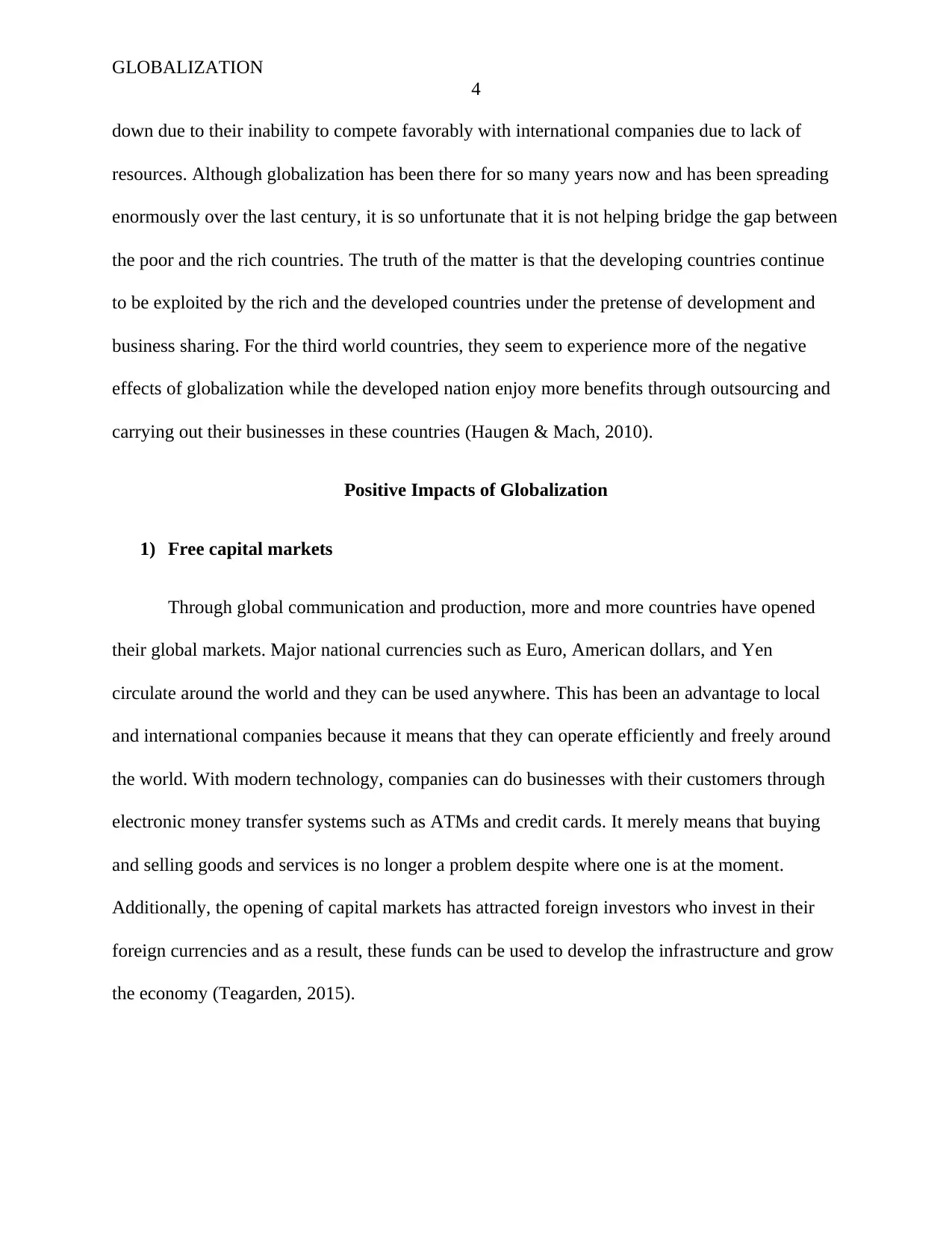
GLOBALIZATION
4
down due to their inability to compete favorably with international companies due to lack of
resources. Although globalization has been there for so many years now and has been spreading
enormously over the last century, it is so unfortunate that it is not helping bridge the gap between
the poor and the rich countries. The truth of the matter is that the developing countries continue
to be exploited by the rich and the developed countries under the pretense of development and
business sharing. For the third world countries, they seem to experience more of the negative
effects of globalization while the developed nation enjoy more benefits through outsourcing and
carrying out their businesses in these countries (Haugen & Mach, 2010).
Positive Impacts of Globalization
1) Free capital markets
Through global communication and production, more and more countries have opened
their global markets. Major national currencies such as Euro, American dollars, and Yen
circulate around the world and they can be used anywhere. This has been an advantage to local
and international companies because it means that they can operate efficiently and freely around
the world. With modern technology, companies can do businesses with their customers through
electronic money transfer systems such as ATMs and credit cards. It merely means that buying
and selling goods and services is no longer a problem despite where one is at the moment.
Additionally, the opening of capital markets has attracted foreign investors who invest in their
foreign currencies and as a result, these funds can be used to develop the infrastructure and grow
the economy (Teagarden, 2015).
4
down due to their inability to compete favorably with international companies due to lack of
resources. Although globalization has been there for so many years now and has been spreading
enormously over the last century, it is so unfortunate that it is not helping bridge the gap between
the poor and the rich countries. The truth of the matter is that the developing countries continue
to be exploited by the rich and the developed countries under the pretense of development and
business sharing. For the third world countries, they seem to experience more of the negative
effects of globalization while the developed nation enjoy more benefits through outsourcing and
carrying out their businesses in these countries (Haugen & Mach, 2010).
Positive Impacts of Globalization
1) Free capital markets
Through global communication and production, more and more countries have opened
their global markets. Major national currencies such as Euro, American dollars, and Yen
circulate around the world and they can be used anywhere. This has been an advantage to local
and international companies because it means that they can operate efficiently and freely around
the world. With modern technology, companies can do businesses with their customers through
electronic money transfer systems such as ATMs and credit cards. It merely means that buying
and selling goods and services is no longer a problem despite where one is at the moment.
Additionally, the opening of capital markets has attracted foreign investors who invest in their
foreign currencies and as a result, these funds can be used to develop the infrastructure and grow
the economy (Teagarden, 2015).
Paraphrase This Document
Need a fresh take? Get an instant paraphrase of this document with our AI Paraphraser
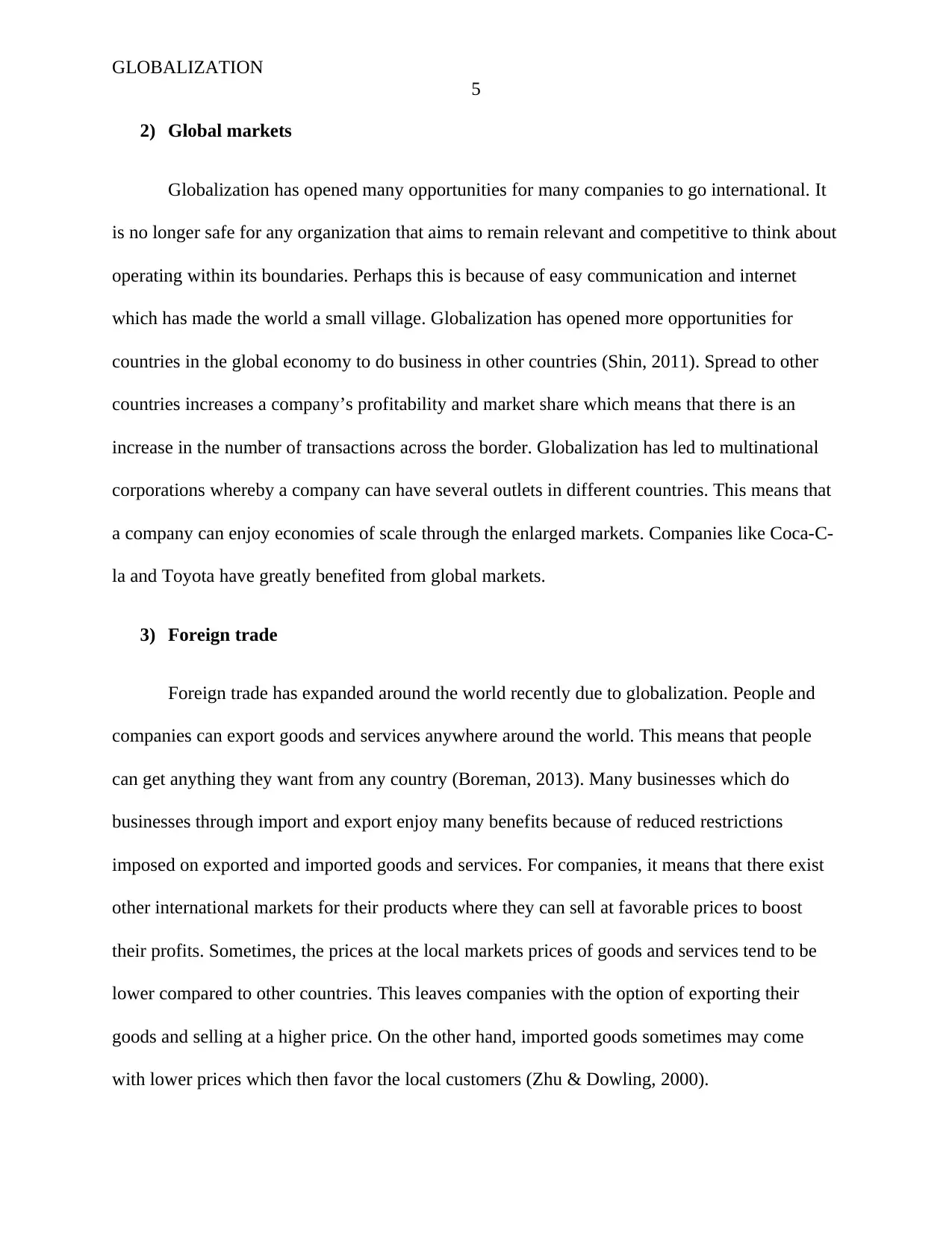
GLOBALIZATION
5
2) Global markets
Globalization has opened many opportunities for many companies to go international. It
is no longer safe for any organization that aims to remain relevant and competitive to think about
operating within its boundaries. Perhaps this is because of easy communication and internet
which has made the world a small village. Globalization has opened more opportunities for
countries in the global economy to do business in other countries (Shin, 2011). Spread to other
countries increases a company’s profitability and market share which means that there is an
increase in the number of transactions across the border. Globalization has led to multinational
corporations whereby a company can have several outlets in different countries. This means that
a company can enjoy economies of scale through the enlarged markets. Companies like Coca-C-
la and Toyota have greatly benefited from global markets.
3) Foreign trade
Foreign trade has expanded around the world recently due to globalization. People and
companies can export goods and services anywhere around the world. This means that people
can get anything they want from any country (Boreman, 2013). Many businesses which do
businesses through import and export enjoy many benefits because of reduced restrictions
imposed on exported and imported goods and services. For companies, it means that there exist
other international markets for their products where they can sell at favorable prices to boost
their profits. Sometimes, the prices at the local markets prices of goods and services tend to be
lower compared to other countries. This leaves companies with the option of exporting their
goods and selling at a higher price. On the other hand, imported goods sometimes may come
with lower prices which then favor the local customers (Zhu & Dowling, 2000).
5
2) Global markets
Globalization has opened many opportunities for many companies to go international. It
is no longer safe for any organization that aims to remain relevant and competitive to think about
operating within its boundaries. Perhaps this is because of easy communication and internet
which has made the world a small village. Globalization has opened more opportunities for
countries in the global economy to do business in other countries (Shin, 2011). Spread to other
countries increases a company’s profitability and market share which means that there is an
increase in the number of transactions across the border. Globalization has led to multinational
corporations whereby a company can have several outlets in different countries. This means that
a company can enjoy economies of scale through the enlarged markets. Companies like Coca-C-
la and Toyota have greatly benefited from global markets.
3) Foreign trade
Foreign trade has expanded around the world recently due to globalization. People and
companies can export goods and services anywhere around the world. This means that people
can get anything they want from any country (Boreman, 2013). Many businesses which do
businesses through import and export enjoy many benefits because of reduced restrictions
imposed on exported and imported goods and services. For companies, it means that there exist
other international markets for their products where they can sell at favorable prices to boost
their profits. Sometimes, the prices at the local markets prices of goods and services tend to be
lower compared to other countries. This leaves companies with the option of exporting their
goods and selling at a higher price. On the other hand, imported goods sometimes may come
with lower prices which then favor the local customers (Zhu & Dowling, 2000).
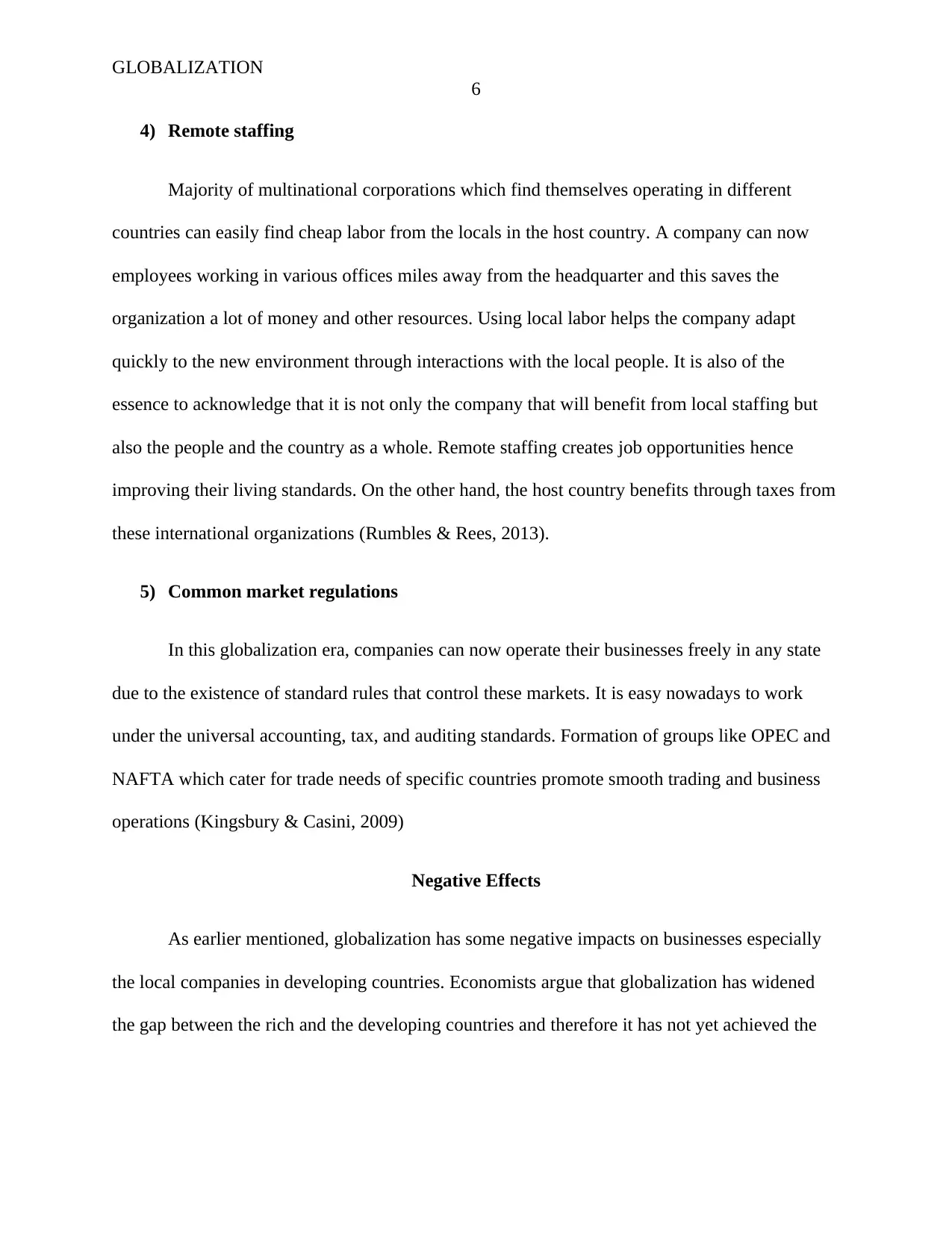
GLOBALIZATION
6
4) Remote staffing
Majority of multinational corporations which find themselves operating in different
countries can easily find cheap labor from the locals in the host country. A company can now
employees working in various offices miles away from the headquarter and this saves the
organization a lot of money and other resources. Using local labor helps the company adapt
quickly to the new environment through interactions with the local people. It is also of the
essence to acknowledge that it is not only the company that will benefit from local staffing but
also the people and the country as a whole. Remote staffing creates job opportunities hence
improving their living standards. On the other hand, the host country benefits through taxes from
these international organizations (Rumbles & Rees, 2013).
5) Common market regulations
In this globalization era, companies can now operate their businesses freely in any state
due to the existence of standard rules that control these markets. It is easy nowadays to work
under the universal accounting, tax, and auditing standards. Formation of groups like OPEC and
NAFTA which cater for trade needs of specific countries promote smooth trading and business
operations (Kingsbury & Casini, 2009)
Negative Effects
As earlier mentioned, globalization has some negative impacts on businesses especially
the local companies in developing countries. Economists argue that globalization has widened
the gap between the rich and the developing countries and therefore it has not yet achieved the
6
4) Remote staffing
Majority of multinational corporations which find themselves operating in different
countries can easily find cheap labor from the locals in the host country. A company can now
employees working in various offices miles away from the headquarter and this saves the
organization a lot of money and other resources. Using local labor helps the company adapt
quickly to the new environment through interactions with the local people. It is also of the
essence to acknowledge that it is not only the company that will benefit from local staffing but
also the people and the country as a whole. Remote staffing creates job opportunities hence
improving their living standards. On the other hand, the host country benefits through taxes from
these international organizations (Rumbles & Rees, 2013).
5) Common market regulations
In this globalization era, companies can now operate their businesses freely in any state
due to the existence of standard rules that control these markets. It is easy nowadays to work
under the universal accounting, tax, and auditing standards. Formation of groups like OPEC and
NAFTA which cater for trade needs of specific countries promote smooth trading and business
operations (Kingsbury & Casini, 2009)
Negative Effects
As earlier mentioned, globalization has some negative impacts on businesses especially
the local companies in developing countries. Economists argue that globalization has widened
the gap between the rich and the developing countries and therefore it has not yet achieved the
⊘ This is a preview!⊘
Do you want full access?
Subscribe today to unlock all pages.

Trusted by 1+ million students worldwide
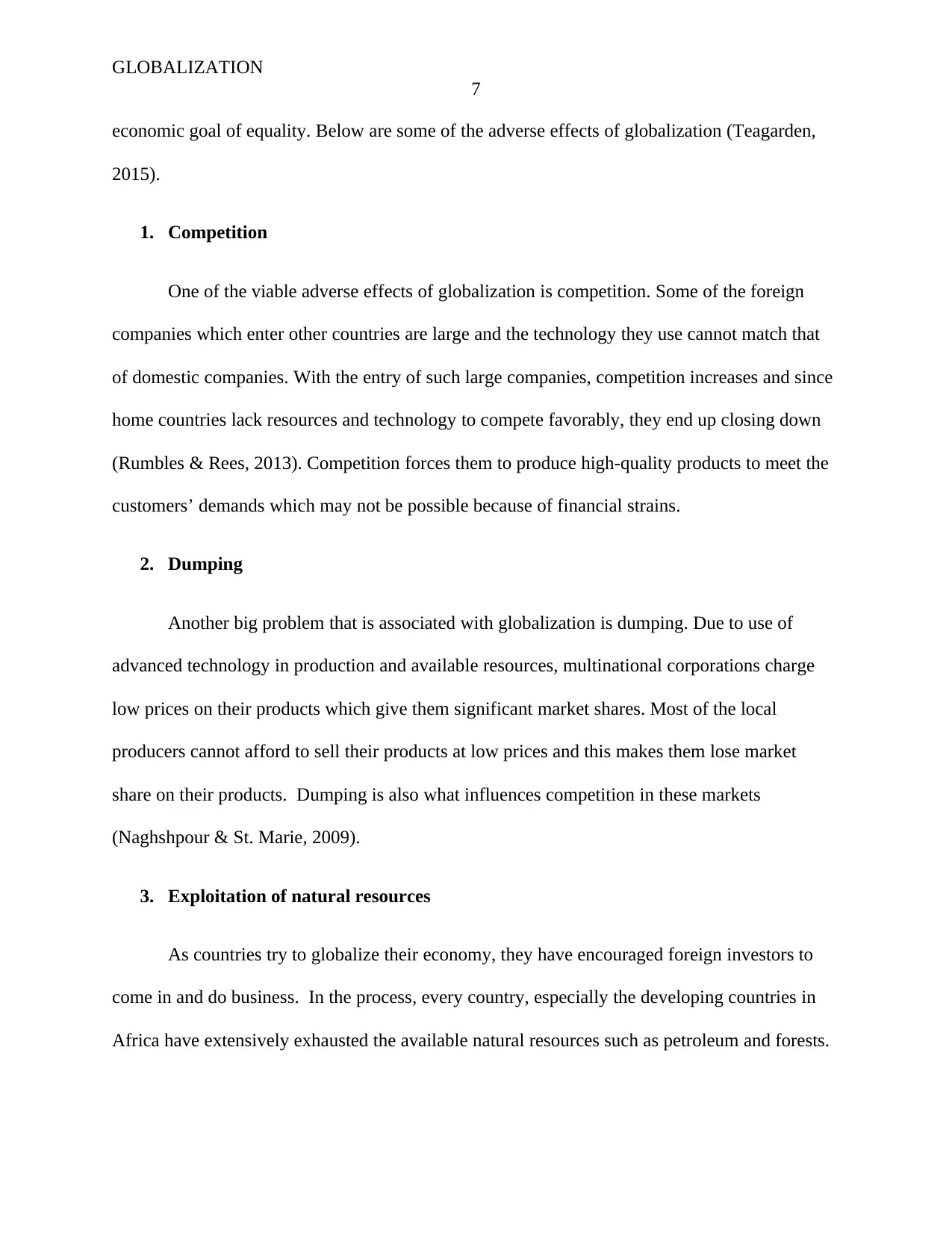
GLOBALIZATION
7
economic goal of equality. Below are some of the adverse effects of globalization (Teagarden,
2015).
1. Competition
One of the viable adverse effects of globalization is competition. Some of the foreign
companies which enter other countries are large and the technology they use cannot match that
of domestic companies. With the entry of such large companies, competition increases and since
home countries lack resources and technology to compete favorably, they end up closing down
(Rumbles & Rees, 2013). Competition forces them to produce high-quality products to meet the
customers’ demands which may not be possible because of financial strains.
2. Dumping
Another big problem that is associated with globalization is dumping. Due to use of
advanced technology in production and available resources, multinational corporations charge
low prices on their products which give them significant market shares. Most of the local
producers cannot afford to sell their products at low prices and this makes them lose market
share on their products. Dumping is also what influences competition in these markets
(Naghshpour & St. Marie, 2009).
3. Exploitation of natural resources
As countries try to globalize their economy, they have encouraged foreign investors to
come in and do business. In the process, every country, especially the developing countries in
Africa have extensively exhausted the available natural resources such as petroleum and forests.
7
economic goal of equality. Below are some of the adverse effects of globalization (Teagarden,
2015).
1. Competition
One of the viable adverse effects of globalization is competition. Some of the foreign
companies which enter other countries are large and the technology they use cannot match that
of domestic companies. With the entry of such large companies, competition increases and since
home countries lack resources and technology to compete favorably, they end up closing down
(Rumbles & Rees, 2013). Competition forces them to produce high-quality products to meet the
customers’ demands which may not be possible because of financial strains.
2. Dumping
Another big problem that is associated with globalization is dumping. Due to use of
advanced technology in production and available resources, multinational corporations charge
low prices on their products which give them significant market shares. Most of the local
producers cannot afford to sell their products at low prices and this makes them lose market
share on their products. Dumping is also what influences competition in these markets
(Naghshpour & St. Marie, 2009).
3. Exploitation of natural resources
As countries try to globalize their economy, they have encouraged foreign investors to
come in and do business. In the process, every country, especially the developing countries in
Africa have extensively exhausted the available natural resources such as petroleum and forests.
Paraphrase This Document
Need a fresh take? Get an instant paraphrase of this document with our AI Paraphraser
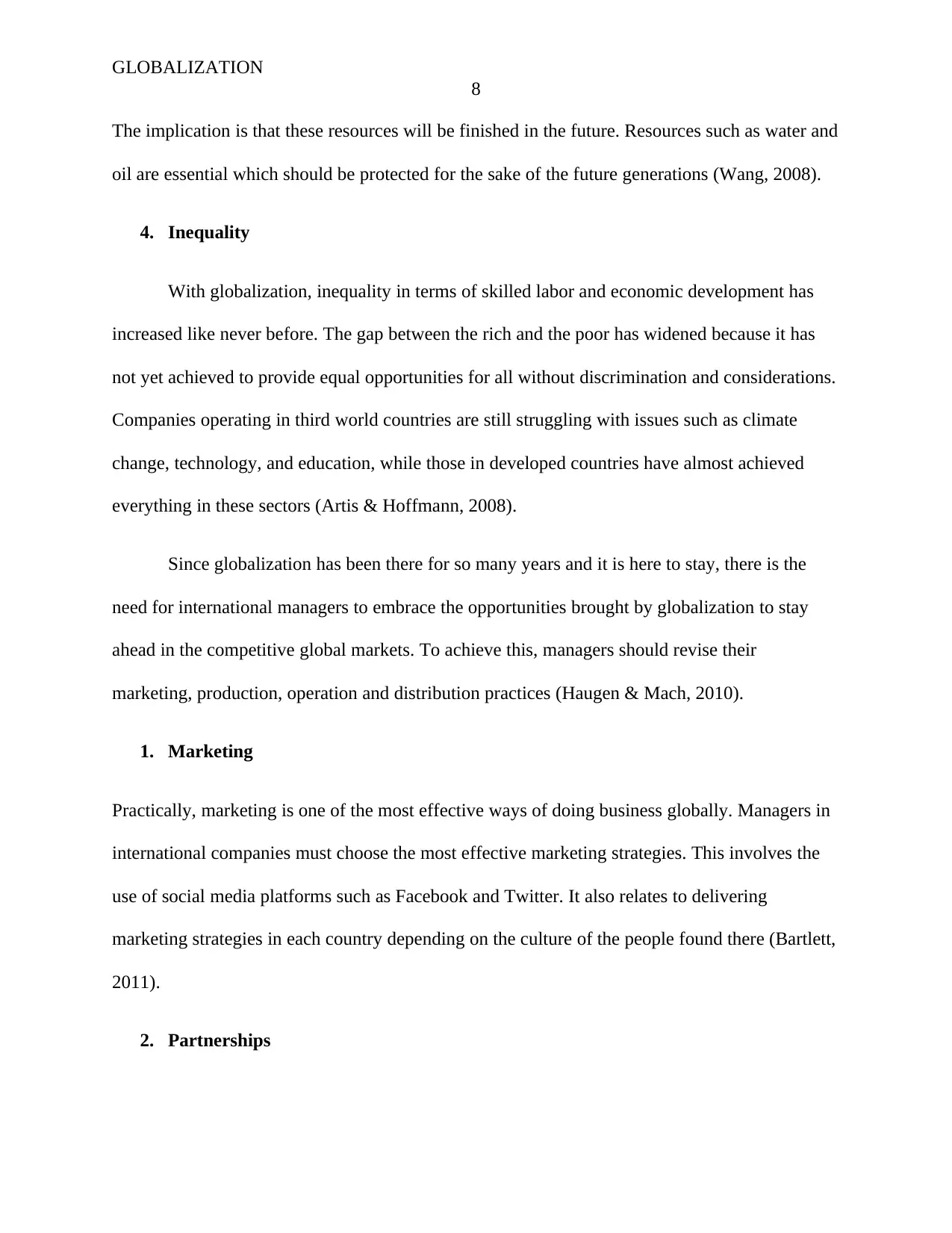
GLOBALIZATION
8
The implication is that these resources will be finished in the future. Resources such as water and
oil are essential which should be protected for the sake of the future generations (Wang, 2008).
4. Inequality
With globalization, inequality in terms of skilled labor and economic development has
increased like never before. The gap between the rich and the poor has widened because it has
not yet achieved to provide equal opportunities for all without discrimination and considerations.
Companies operating in third world countries are still struggling with issues such as climate
change, technology, and education, while those in developed countries have almost achieved
everything in these sectors (Artis & Hoffmann, 2008).
Since globalization has been there for so many years and it is here to stay, there is the
need for international managers to embrace the opportunities brought by globalization to stay
ahead in the competitive global markets. To achieve this, managers should revise their
marketing, production, operation and distribution practices (Haugen & Mach, 2010).
1. Marketing
Practically, marketing is one of the most effective ways of doing business globally. Managers in
international companies must choose the most effective marketing strategies. This involves the
use of social media platforms such as Facebook and Twitter. It also relates to delivering
marketing strategies in each country depending on the culture of the people found there (Bartlett,
2011).
2. Partnerships
8
The implication is that these resources will be finished in the future. Resources such as water and
oil are essential which should be protected for the sake of the future generations (Wang, 2008).
4. Inequality
With globalization, inequality in terms of skilled labor and economic development has
increased like never before. The gap between the rich and the poor has widened because it has
not yet achieved to provide equal opportunities for all without discrimination and considerations.
Companies operating in third world countries are still struggling with issues such as climate
change, technology, and education, while those in developed countries have almost achieved
everything in these sectors (Artis & Hoffmann, 2008).
Since globalization has been there for so many years and it is here to stay, there is the
need for international managers to embrace the opportunities brought by globalization to stay
ahead in the competitive global markets. To achieve this, managers should revise their
marketing, production, operation and distribution practices (Haugen & Mach, 2010).
1. Marketing
Practically, marketing is one of the most effective ways of doing business globally. Managers in
international companies must choose the most effective marketing strategies. This involves the
use of social media platforms such as Facebook and Twitter. It also relates to delivering
marketing strategies in each country depending on the culture of the people found there (Bartlett,
2011).
2. Partnerships
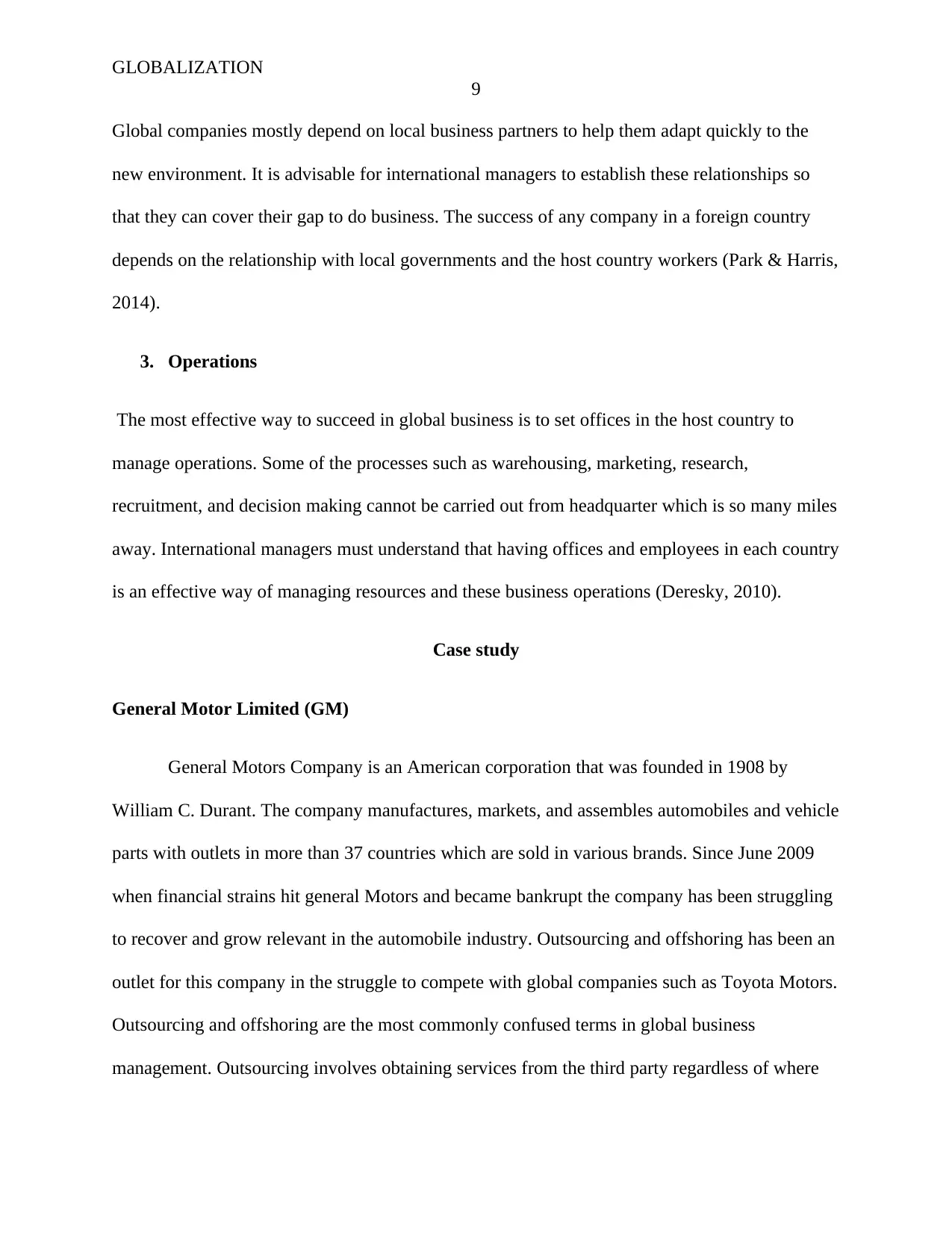
GLOBALIZATION
9
Global companies mostly depend on local business partners to help them adapt quickly to the
new environment. It is advisable for international managers to establish these relationships so
that they can cover their gap to do business. The success of any company in a foreign country
depends on the relationship with local governments and the host country workers (Park & Harris,
2014).
3. Operations
The most effective way to succeed in global business is to set offices in the host country to
manage operations. Some of the processes such as warehousing, marketing, research,
recruitment, and decision making cannot be carried out from headquarter which is so many miles
away. International managers must understand that having offices and employees in each country
is an effective way of managing resources and these business operations (Deresky, 2010).
Case study
General Motor Limited (GM)
General Motors Company is an American corporation that was founded in 1908 by
William C. Durant. The company manufactures, markets, and assembles automobiles and vehicle
parts with outlets in more than 37 countries which are sold in various brands. Since June 2009
when financial strains hit general Motors and became bankrupt the company has been struggling
to recover and grow relevant in the automobile industry. Outsourcing and offshoring has been an
outlet for this company in the struggle to compete with global companies such as Toyota Motors.
Outsourcing and offshoring are the most commonly confused terms in global business
management. Outsourcing involves obtaining services from the third party regardless of where
9
Global companies mostly depend on local business partners to help them adapt quickly to the
new environment. It is advisable for international managers to establish these relationships so
that they can cover their gap to do business. The success of any company in a foreign country
depends on the relationship with local governments and the host country workers (Park & Harris,
2014).
3. Operations
The most effective way to succeed in global business is to set offices in the host country to
manage operations. Some of the processes such as warehousing, marketing, research,
recruitment, and decision making cannot be carried out from headquarter which is so many miles
away. International managers must understand that having offices and employees in each country
is an effective way of managing resources and these business operations (Deresky, 2010).
Case study
General Motor Limited (GM)
General Motors Company is an American corporation that was founded in 1908 by
William C. Durant. The company manufactures, markets, and assembles automobiles and vehicle
parts with outlets in more than 37 countries which are sold in various brands. Since June 2009
when financial strains hit general Motors and became bankrupt the company has been struggling
to recover and grow relevant in the automobile industry. Outsourcing and offshoring has been an
outlet for this company in the struggle to compete with global companies such as Toyota Motors.
Outsourcing and offshoring are the most commonly confused terms in global business
management. Outsourcing involves obtaining services from the third party regardless of where
⊘ This is a preview!⊘
Do you want full access?
Subscribe today to unlock all pages.

Trusted by 1+ million students worldwide
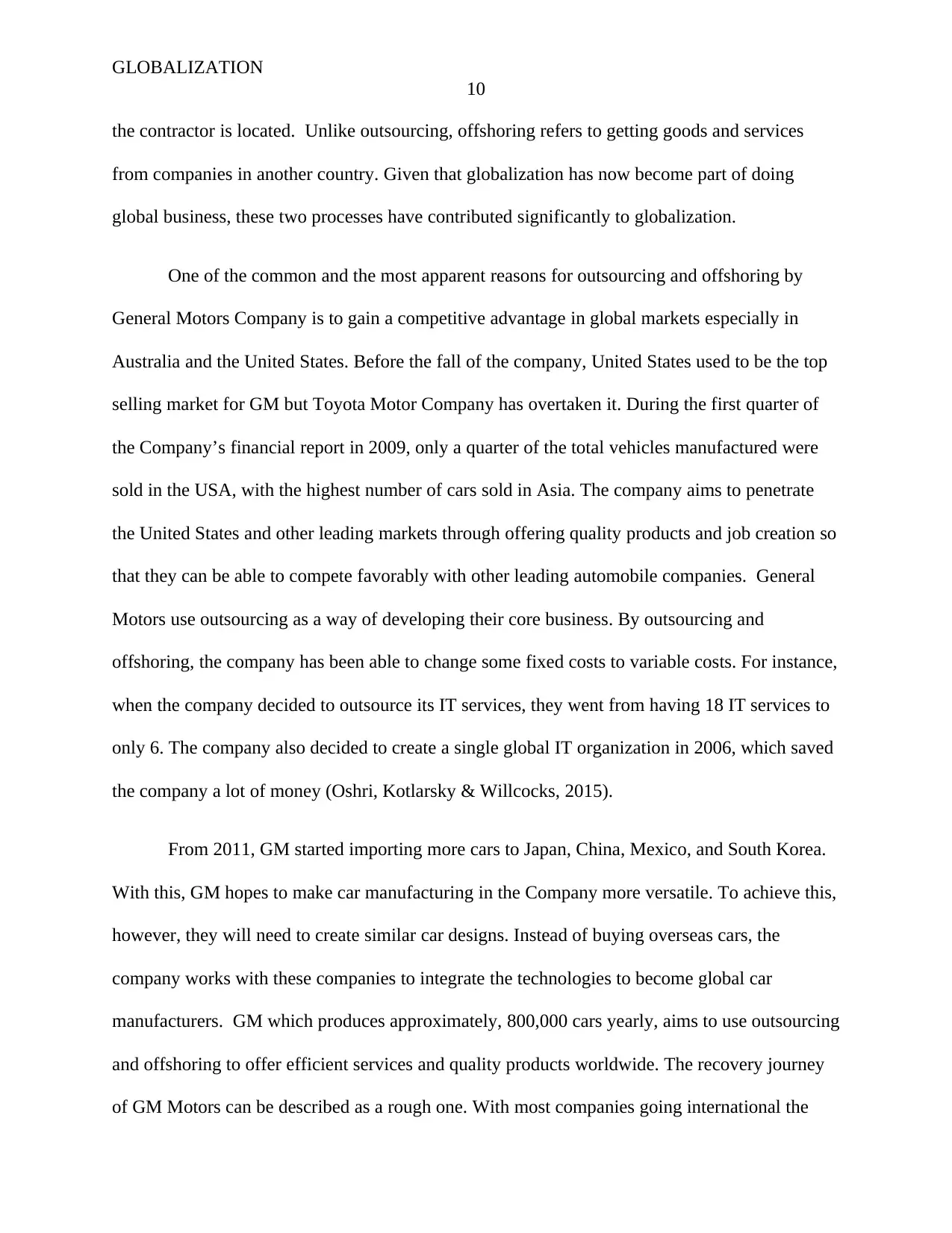
GLOBALIZATION
10
the contractor is located. Unlike outsourcing, offshoring refers to getting goods and services
from companies in another country. Given that globalization has now become part of doing
global business, these two processes have contributed significantly to globalization.
One of the common and the most apparent reasons for outsourcing and offshoring by
General Motors Company is to gain a competitive advantage in global markets especially in
Australia and the United States. Before the fall of the company, United States used to be the top
selling market for GM but Toyota Motor Company has overtaken it. During the first quarter of
the Company’s financial report in 2009, only a quarter of the total vehicles manufactured were
sold in the USA, with the highest number of cars sold in Asia. The company aims to penetrate
the United States and other leading markets through offering quality products and job creation so
that they can be able to compete favorably with other leading automobile companies. General
Motors use outsourcing as a way of developing their core business. By outsourcing and
offshoring, the company has been able to change some fixed costs to variable costs. For instance,
when the company decided to outsource its IT services, they went from having 18 IT services to
only 6. The company also decided to create a single global IT organization in 2006, which saved
the company a lot of money (Oshri, Kotlarsky & Willcocks, 2015).
From 2011, GM started importing more cars to Japan, China, Mexico, and South Korea.
With this, GM hopes to make car manufacturing in the Company more versatile. To achieve this,
however, they will need to create similar car designs. Instead of buying overseas cars, the
company works with these companies to integrate the technologies to become global car
manufacturers. GM which produces approximately, 800,000 cars yearly, aims to use outsourcing
and offshoring to offer efficient services and quality products worldwide. The recovery journey
of GM Motors can be described as a rough one. With most companies going international the
10
the contractor is located. Unlike outsourcing, offshoring refers to getting goods and services
from companies in another country. Given that globalization has now become part of doing
global business, these two processes have contributed significantly to globalization.
One of the common and the most apparent reasons for outsourcing and offshoring by
General Motors Company is to gain a competitive advantage in global markets especially in
Australia and the United States. Before the fall of the company, United States used to be the top
selling market for GM but Toyota Motor Company has overtaken it. During the first quarter of
the Company’s financial report in 2009, only a quarter of the total vehicles manufactured were
sold in the USA, with the highest number of cars sold in Asia. The company aims to penetrate
the United States and other leading markets through offering quality products and job creation so
that they can be able to compete favorably with other leading automobile companies. General
Motors use outsourcing as a way of developing their core business. By outsourcing and
offshoring, the company has been able to change some fixed costs to variable costs. For instance,
when the company decided to outsource its IT services, they went from having 18 IT services to
only 6. The company also decided to create a single global IT organization in 2006, which saved
the company a lot of money (Oshri, Kotlarsky & Willcocks, 2015).
From 2011, GM started importing more cars to Japan, China, Mexico, and South Korea.
With this, GM hopes to make car manufacturing in the Company more versatile. To achieve this,
however, they will need to create similar car designs. Instead of buying overseas cars, the
company works with these companies to integrate the technologies to become global car
manufacturers. GM which produces approximately, 800,000 cars yearly, aims to use outsourcing
and offshoring to offer efficient services and quality products worldwide. The recovery journey
of GM Motors can be described as a rough one. With most companies going international the
Paraphrase This Document
Need a fresh take? Get an instant paraphrase of this document with our AI Paraphraser
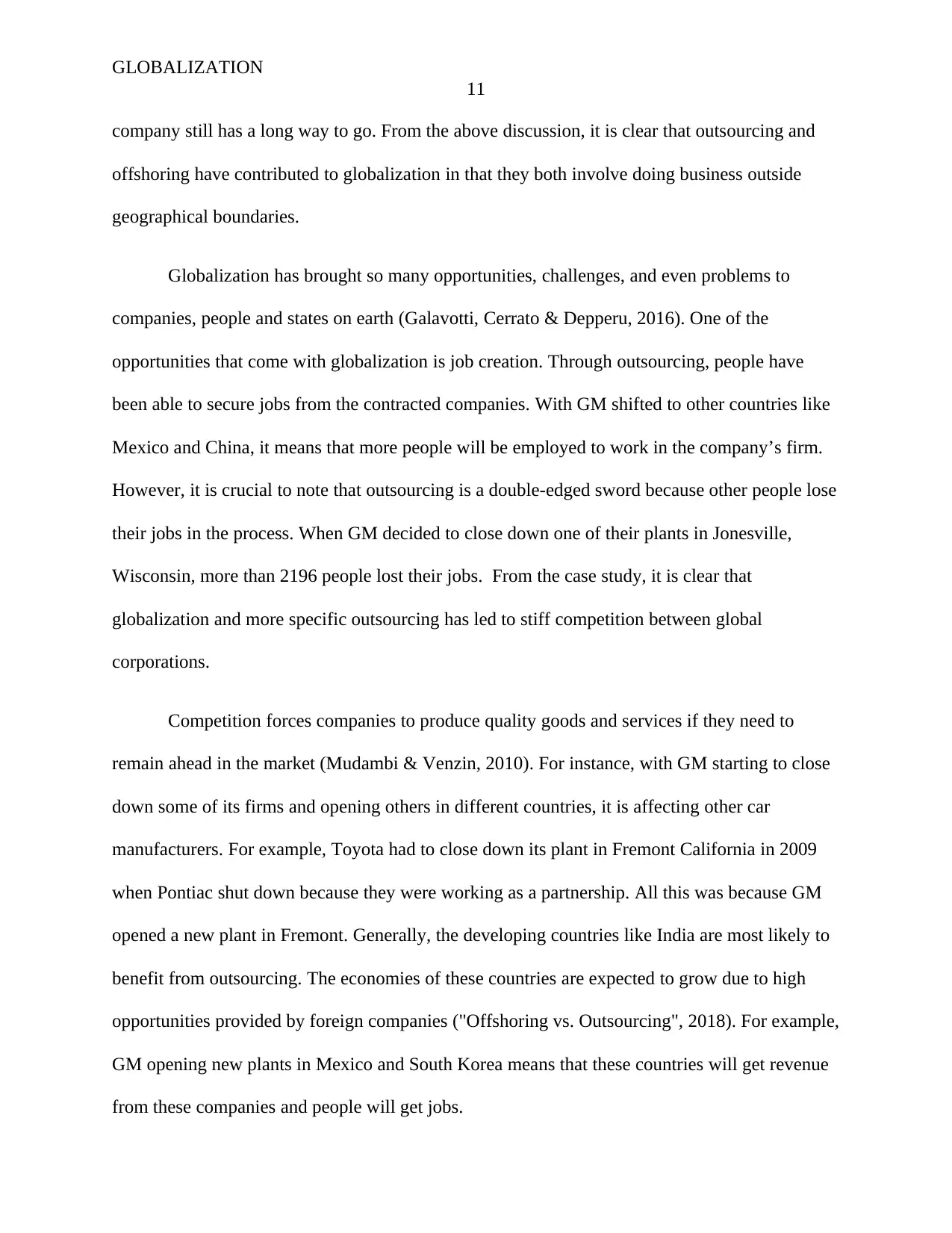
GLOBALIZATION
11
company still has a long way to go. From the above discussion, it is clear that outsourcing and
offshoring have contributed to globalization in that they both involve doing business outside
geographical boundaries.
Globalization has brought so many opportunities, challenges, and even problems to
companies, people and states on earth (Galavotti, Cerrato & Depperu, 2016). One of the
opportunities that come with globalization is job creation. Through outsourcing, people have
been able to secure jobs from the contracted companies. With GM shifted to other countries like
Mexico and China, it means that more people will be employed to work in the company’s firm.
However, it is crucial to note that outsourcing is a double-edged sword because other people lose
their jobs in the process. When GM decided to close down one of their plants in Jonesville,
Wisconsin, more than 2196 people lost their jobs. From the case study, it is clear that
globalization and more specific outsourcing has led to stiff competition between global
corporations.
Competition forces companies to produce quality goods and services if they need to
remain ahead in the market (Mudambi & Venzin, 2010). For instance, with GM starting to close
down some of its firms and opening others in different countries, it is affecting other car
manufacturers. For example, Toyota had to close down its plant in Fremont California in 2009
when Pontiac shut down because they were working as a partnership. All this was because GM
opened a new plant in Fremont. Generally, the developing countries like India are most likely to
benefit from outsourcing. The economies of these countries are expected to grow due to high
opportunities provided by foreign companies ("Offshoring vs. Outsourcing", 2018). For example,
GM opening new plants in Mexico and South Korea means that these countries will get revenue
from these companies and people will get jobs.
11
company still has a long way to go. From the above discussion, it is clear that outsourcing and
offshoring have contributed to globalization in that they both involve doing business outside
geographical boundaries.
Globalization has brought so many opportunities, challenges, and even problems to
companies, people and states on earth (Galavotti, Cerrato & Depperu, 2016). One of the
opportunities that come with globalization is job creation. Through outsourcing, people have
been able to secure jobs from the contracted companies. With GM shifted to other countries like
Mexico and China, it means that more people will be employed to work in the company’s firm.
However, it is crucial to note that outsourcing is a double-edged sword because other people lose
their jobs in the process. When GM decided to close down one of their plants in Jonesville,
Wisconsin, more than 2196 people lost their jobs. From the case study, it is clear that
globalization and more specific outsourcing has led to stiff competition between global
corporations.
Competition forces companies to produce quality goods and services if they need to
remain ahead in the market (Mudambi & Venzin, 2010). For instance, with GM starting to close
down some of its firms and opening others in different countries, it is affecting other car
manufacturers. For example, Toyota had to close down its plant in Fremont California in 2009
when Pontiac shut down because they were working as a partnership. All this was because GM
opened a new plant in Fremont. Generally, the developing countries like India are most likely to
benefit from outsourcing. The economies of these countries are expected to grow due to high
opportunities provided by foreign companies ("Offshoring vs. Outsourcing", 2018). For example,
GM opening new plants in Mexico and South Korea means that these countries will get revenue
from these companies and people will get jobs.
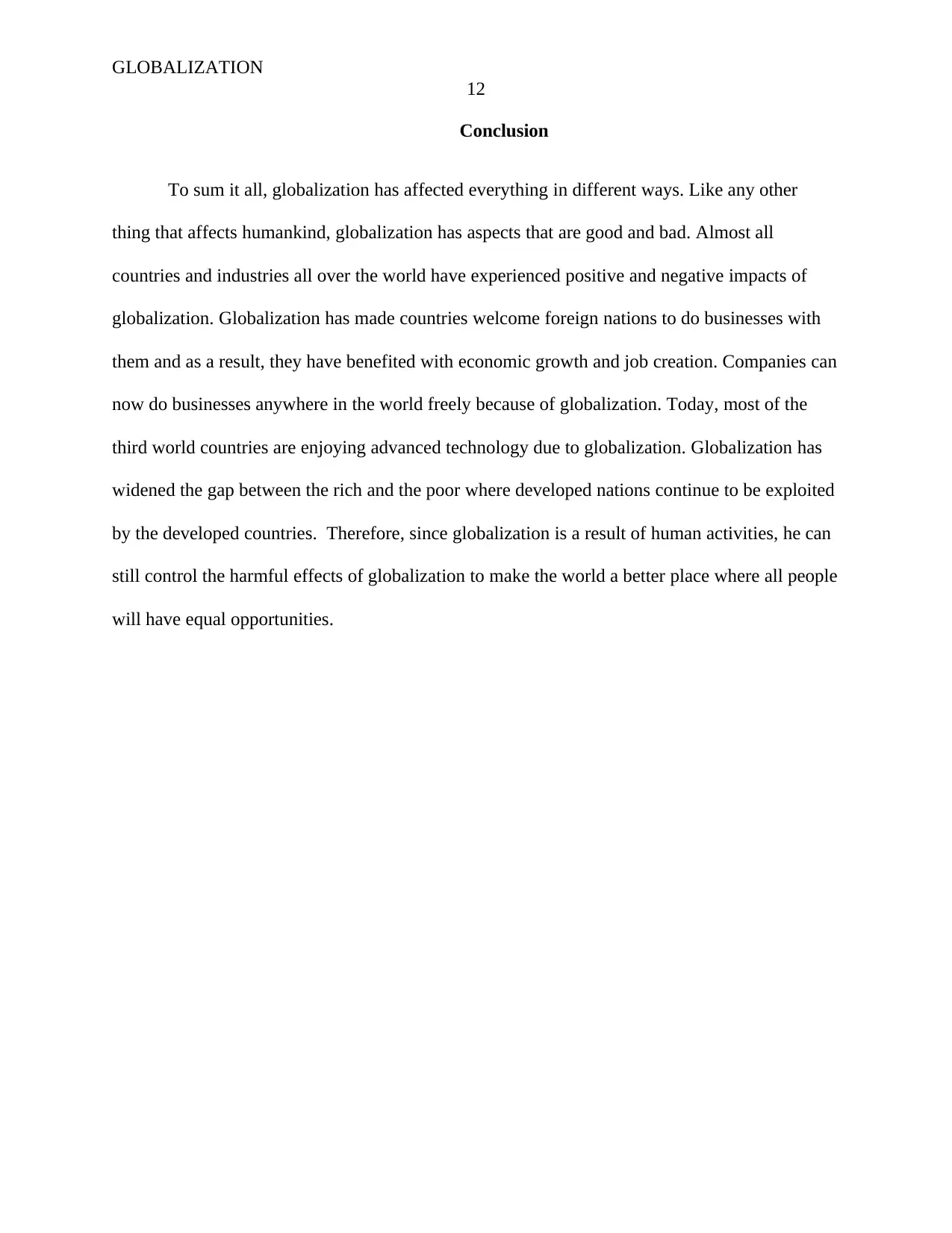
GLOBALIZATION
12
Conclusion
To sum it all, globalization has affected everything in different ways. Like any other
thing that affects humankind, globalization has aspects that are good and bad. Almost all
countries and industries all over the world have experienced positive and negative impacts of
globalization. Globalization has made countries welcome foreign nations to do businesses with
them and as a result, they have benefited with economic growth and job creation. Companies can
now do businesses anywhere in the world freely because of globalization. Today, most of the
third world countries are enjoying advanced technology due to globalization. Globalization has
widened the gap between the rich and the poor where developed nations continue to be exploited
by the developed countries. Therefore, since globalization is a result of human activities, he can
still control the harmful effects of globalization to make the world a better place where all people
will have equal opportunities.
12
Conclusion
To sum it all, globalization has affected everything in different ways. Like any other
thing that affects humankind, globalization has aspects that are good and bad. Almost all
countries and industries all over the world have experienced positive and negative impacts of
globalization. Globalization has made countries welcome foreign nations to do businesses with
them and as a result, they have benefited with economic growth and job creation. Companies can
now do businesses anywhere in the world freely because of globalization. Today, most of the
third world countries are enjoying advanced technology due to globalization. Globalization has
widened the gap between the rich and the poor where developed nations continue to be exploited
by the developed countries. Therefore, since globalization is a result of human activities, he can
still control the harmful effects of globalization to make the world a better place where all people
will have equal opportunities.
⊘ This is a preview!⊘
Do you want full access?
Subscribe today to unlock all pages.

Trusted by 1+ million students worldwide
1 out of 15
Related Documents
Your All-in-One AI-Powered Toolkit for Academic Success.
+13062052269
info@desklib.com
Available 24*7 on WhatsApp / Email
![[object Object]](/_next/static/media/star-bottom.7253800d.svg)
Unlock your academic potential
Copyright © 2020–2026 A2Z Services. All Rights Reserved. Developed and managed by ZUCOL.





